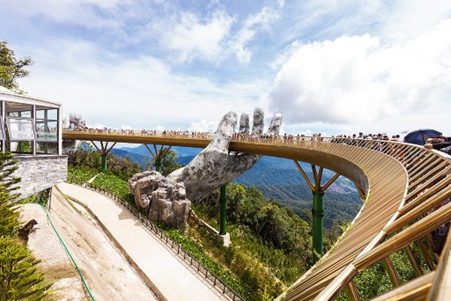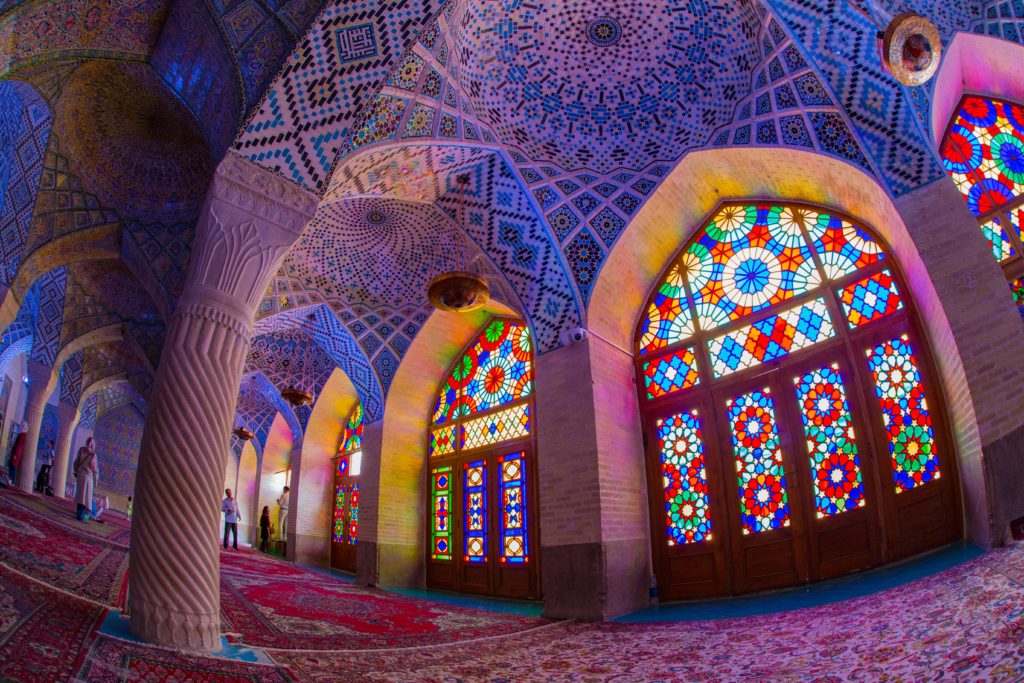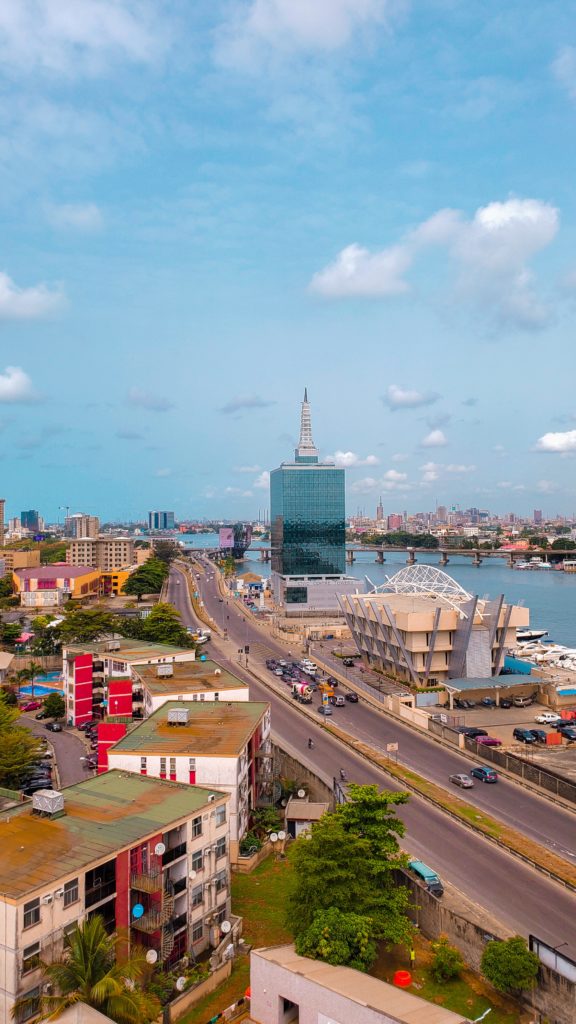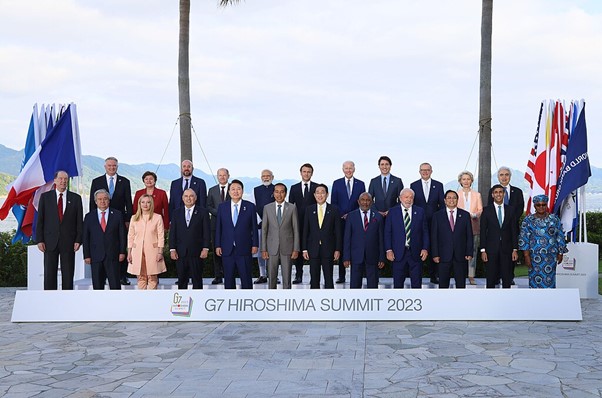1. Biden cancels Australia trip
Image Japan Cabinet Public Relations Office via Wikimedia Commons
Biden cancelled his Australia visit to meet with Quad nations. Quadrilateral Security Dialogue members Australia, India, Japan, and the United States were supposed to meet in Sydney before the G7 however Biden cancelled his visit 1 week before the story trip was supposed to happen.
Biden went on to attend the G& summit in Hiroshima where EU President Ursula von der Leyen said she hopes that they will “take forward the Critical Raw Materials Club at this G7 meeting.” The G7 reportedly focused on securing cooperation in critical raw materials away from the threat of overdependency on China.
2. Adani enters Vietnam

Image Wikimedia Commons Golden Bridge Da Nang, Vietnam
Adani Group has announced its intention to invest $3 billion in Vietnam building seaport and energy infrastructure.
Some sources say Adani Group Chair has pledged as much as $10 billion long-term investment in Vietnam with the first investment to be in the city of Da Nang in the Lien Chieu port, creating a warehouse & logistics park in the area.
Adani Group is an Indian commodities company that derives 60% of its value from coal-related products. It was founded in 1988 and is headquartered in India.
3. London’s soft power

Image benjamin davies via unsplash
A new report ranks London as top city for digital visibility in the UK followed by Liverpool and Manchester. London creates around 50% of all UK conversations, the report says. It goes on to correlate visibility with soft power, or persuasiveness in international relations.
The UK ranks second after the US in a similar report that assesses soft power by country, followed by Germany, China, and Japan. Soft power categories consist of culture, political values, and policies. The BrandFinance report collates perception of nation brands in to rank them top to bottom. The UK is a most influential in the culture realm due to the English language’s permeation of the modern world in general, artistic influence such as Shakespeare and Harry Potter, the English law system, English education for example Eton, Oxford and Cambridge, and the cultural activities in the capital itself, London’s West End.
Soft power can boost FDI attractiveness and thereby increase GDP. The popularity of the United Kingdom’s global reputation makes it a superpower albeit in a different way to the hard power it was known for centuries ago.
4. Iran’s economic situation

Image steven su via unsplash
In March the E3 – which consists of the UK, France and Germany – decided to end an official agreement with Iran, INSTEX, which was launched in 2019. INSTEX was originally set up to reduce the impact of US sanctions in relation to humanitarian goods, for example medicines.
INSTEX was set up after Washington decided to implement sanctions against Iran in 2018 after it pulled out of Joint Comprehensive Plan of Action (JCPOA) nuclear deal. Earlier this year, Europe spoke out in favour of JCPOA whilst Biden proclaimed it dead in response to an unofficial question at an event.
The E3 group cited obstruction by Iran. The spokesperson said despite demand from European exporters, Iran has made it impossible for the group to deliver its remit, “a political determination to impede the use of INSTEX under any circumstances.”
The Eurasian Economic Union (EAEU) consisting of Armenia, Belarus, Kazakhstan, Kyrgyzstan and Russia has just announced a potential free trade agreement.
Weirdly, trade between Iran and Europe increased 8% in 2022 compared to 2021. Some Tehran news sources say a Europe – Iran deal would benefit China.
5. Nigeria emerges as Africa’s FDI hub of digital technology

Image nupo deyon daniel via unsplash
Nigeria is Africa’s top FDI destination according to National Information Technology Development Agency (NITDA), in years 2015, 2019 and 2020. In 2022, Nigeria achieved a 100% increase of 2021, attracting inbound FDI to the value of $4.8 billion, mostly due to a resurgence in the oil & gas sectors.
However, in 2022 investment slumped by a third last year to $1.06 billion, from before Tinubu took office, a 90% drop since the 2008 high of $4.7 billion and the lowest level since 2017.
Nigeria has reserves of 44 different critical worth $700 billion such as lithium, manganese and nickel. Earlier this year the Africa Finance Corporation (AFC) established a partnership with sovereign wealth fund Solid Minerals Development Fund (SMDF) to deliver funding to accelerate Nigerian mining projects.
6. Bureaucracy may hamper India’s allure as FDI destination: Moody’s

Image raghu nayyar via unsplash
Moody’s Investors Service credit rating agency has released a statement saying that India’s bureaucracy could hamper inward FDI in manufacturing and industrial sectors.
The statement specifically mentions the amount of time and administration required to obtain land acquisition approvals, regulatory clearances, licenses and opening a business as obstructive to the rate of growth and attractiveness of India to outside investors. Moody even goes as far as to mention other destinations as better alternatives, those being Vietnam and Indonesia.
India has made steps to modernise processes and laws around labour and infrastructure investment
Featured image credit Japan Cabinet Public Relations Office via Wikimedia Commons







